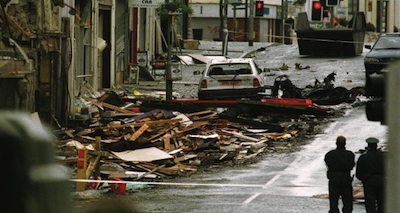
The British government continues to use national security to prevent potentially embarrassing details of its ‘black operations’ in the North emerging into the public domain.
A bid for a secret court hearing over the activities of the Crown forces during the 1998 Omagh bombing is set to get underway next month. The move forms part of legal efforts by British Direct Ruler Theresa Villiers to prevent a public inquiry into the tragedy. Michael Gallagher, whose son Aiden was among those killed, is seeking to have that decision judicially reviewed.
Twenty-nine people were killed when telephoned warnings failed to clear the area around a bomb blamed on the breakaway ‘Real IRA’. The case centres on allegations that British security agents, MI5 and RUC members allowed the attack to proceed in furtherance of their own political agenda.
At issue is the monitoring of the cars used as they crossed the border into Omagh on the day of the attack.
In advance of the legal challenge being heard in full, the British government is to seek a “closed material procedure” (CMP), a secret court hearing in the absence of Mr Gallagher and his legal team. They will use the hearing to lobby the judge to accept that disclosure of information about the attack would be damaging to “national security”.
It would be the first such legal bid in judicial review proceedings in the North of Ireland. The first stage is listed for a two-day hearing next month.
It is one of the more recent of hundreds of cases which continue to fill the court system in the North in which the British government has claimed that ‘national security’ prevents them from revealing information.
Last November, after weeks of talks, the ‘Fresh Start’ agreement was reached by Sinn Fein, the DUP and the British government, in which they agreed to shelve political efforts to deal with the legacy of the conflict. However, victims of the conflict have vowed to continue their struggle for truth through the courts.
Among them are the victims of ‘Stakeknife’, the British agent in the Provisional IRA who carried out a series of killings of alleged informers in furtherance of a British agenda. The man publicly identified as that agent, Freddie Scappaticci has still not been charged with any offence, despite personally revealing details which appear to confirm his involvement.
Many victims of the North’s biggest state-operated death squad, the Glenanne Gang who murdered over 130 people, also remain determined to defy the politicians. Next month, a test case resumes in Belfast’s High Court brought by the brother of one of the gang’s victims against the PSNI police.
Over the years, some of those bereaved have become despondent, believing that those at risk of reputational damage are simply hoping that time will quell the demands of the victims as an older generation dies off.
But South Armagh native Sarah Reavey, who lost three of her cousins to the gang as a child, recently explained why she continues to campaign.
“I can see why people would say that we should just leave it behind, but they are coming from a place of ignorance.
“It is a matter of principle and of dealing with injustice. History has to be told accurately. As it stands, people don’t know what happened, not just to the Reavey boys.”
![[Irish Republican News]](https://republican-news.org/graphics/title_gifs/rn.gif)
![[Irish Republican News]](https://republican-news.org/graphics/title_gifs/harp.gif)

